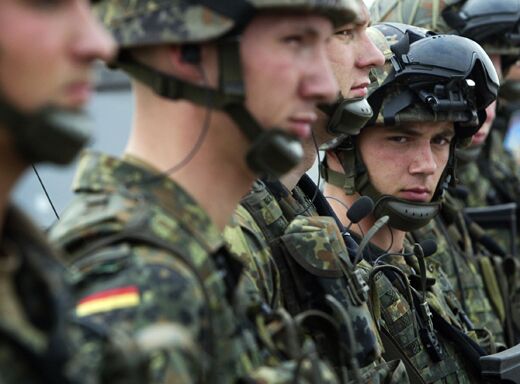
Germany’s Merkel Seeks a European Army
After World War ii lay claim to 50 million lives, the idea of a European community was supposed to ensure such aggression would not be witnessed again. Instead, the primary aggressor in that war is using that idea to reorder Europe to its liking. To increase the pressure on less-influential European states, Germany is once more threatening war in Europe unless efforts toward unifying the Continent continue.
Germany’s Angela Merkel told Bild on March 23, “We should not take peace and democracy for granted. The ideal of European unification is still today a question of war and peace.” Merkel bluntly highlighted one of the initial purposes for what is today the European Union: to bridle German militarism.
But along with her call for pressing forward with still greater European integration, Merkel called for a pan-European military: “In the European Union we have to come closer to the creation of a European army.”
What Merkel envisions for Europe is far grander and more potent than the 60,000 multi-national Eurocorps currently on hand. The European Union’s Eurocorps falls far short of being the truly globally potent military that Germany has wanted for some time.
A leaked 2003 German military planning document obtained by Britain (published in the Telegraph, Oct. 24, 2003) explained that “a European army legitimized and financed by the European Parliament is the visionary goal of Germany policy.” German Foreign Minister Joschka Fischer once told Britain’s Guardian newspaper, “Transforming the European Union into a single state with one army, one constitution and one foreign policy is the critical challenge of the age ….”
Why does Germany want to abolish national armies and build one super-European army?
Consider: No single EU member state can match American military expenditures on its own. America spends 3.7 percent of every tax dollar on defense; most European states spend 2 percent or less. Thus, Germany has suggested that all EU member states pool their national resources. German leaders believe that if EU member states pooled their national budgets together, the Continent could dramatically improve its military capabilities. The 2003 document, for example, included such provisions as building a centralized military command, having the military report to the European Parliament, building joint defense systems, and integrating nuclear arsenals (which would be French and British) into European defense.
Certainly, Germany wants to build an economic and military power out of the European Union. It has already played an important role in foisting the euro onto Europe; now it wants full political union. But for the European integration project to truly be able to project its power on the global scene, it also needs a strong European army.
This is truly a visionary goal. Already it has some high-profile supporters among EU nations outside of Germany. Former Italian Prime Minister Silvio Berlusconi embraced the concept; current Italian Prime Minister Romano Prodi once said “the EU should have its own army from countries which accept a common defense”; outgoing French President Jacques Chirac once said “the European Union cannot fully exist until it possesses autonomous capacity for action in the area of defense.”
However, interestingly, Merkel’s call for a European army comes at a time when Europe doesn’t have a democratic mandate from the European people. Not only that, the challenge of building a European army is made greater by the absence of a European constitution authorizing such a pooling of autonomous national resources within Europe.
Nevertheless, these kinds of realities have never stood in the way of European and German ambitions to unite Europe. Without public support, any effort by Germany to proceed with building the institutions outlined within the failed constitution demonstrates its lack of respect for Europe’s democratic underpinnings. Still, Europe continues to build as if it is one mega-superpower—a United States of Europe—without legal undergirding.
The architects of European integration clearly plan to continue pushing for assimilation. The track record of successfully building Europe without a mandate shows that Germany will most likely succeed in its course. It has been Europe’s standard protocol to first build an institution, and then, once built, put a law on the books acknowledging its reality.
Soon enough, Europeans will be startled to find out that they have an empire on their hands, complete with all the trappings. However, they will also be startled to realize that they are no longer Frenchmen, Poles, Spaniards and Austrians, but members of a third German-led empire.
Truly, with France and Britain—two lynchpin powers Europe has so often counted on to counterbalance German ambitions in Europe—as feeble as they are today, the rise of Germany within Europe is assured.
Watch for Germany to continue to push for its visionary goal in Europe: a powerful united super-European army. Also watch for Germany to bully its way into control of its military command and decision-making, and even potentially to become a de facto nuclear power by gaining control of French nuclear bombs.
To fully understand where Germany’s revived militarism is leading, read Germany and the Holy Roman Empire.
